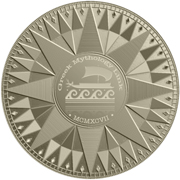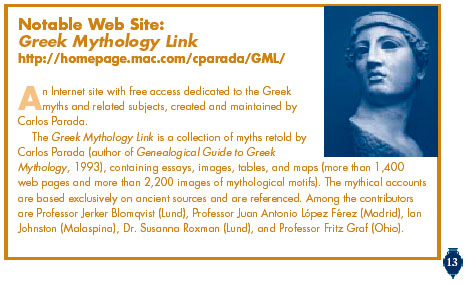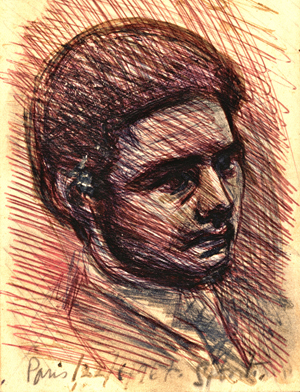 |
|

- Homère est nouveau, ce matin,
et rien n'est peut-être aussi vieux
que le journal d'aujourd'hui.
(Charles Péguy, 1878-1914).
|
The Greek Mythology Link is a collection of the Greek myths written by Carlos Parada, author of the book Genealogical Guide to Greek Mythology (published in 1993 by Paul Åströms förlag, available at Amazon). A list of libraries in the USA and other countries where this book can be found is included in that page. Genealogical Guide to Greek Mythology and the Greek Mythology Link are based on original sources, that is, authors from the period between 800 BC and AD 600 (see Bibliography).The Greek Mythology Link contains Texts, Images, Maps and Charts.
The Greek Mythology Link is primarily concerned with the creative, artistic, literary and inspiring aspects of the Greek myths. The Greek Mythology Link is not concerned with the historical, religious, liturgical, anthropological, archaeological, philosophical, ideological, sociological, linguistic, or psychoanalytical approaches to the Greek myths. Comparative mythology and literary analysis are not the main concern of this site either. References to these or similar analytical approaches are occasional.
Other features:
The network created by genealogy has been given particular attention, as well as some structural aspects derived from it. The genealogy of characters usually appears separated from the main text in each page. The subscript numbers following the names are for identification purposes only. They are consistent throughout all texts but do not point out a chronological order. The absence of a number indicates that there is only one mythological character with that particular name. The numbers do not belong originally to the names.
The main information about a character is found in Biographies, but more information may be found consulting the GROUPS, or even in the section Places and Peoples where the mythical history of cities (and throne succession) is narrated.
Charts are of two different kinds: Genealogical and Contextual.
A number of images illustrate the texts. Others are collected in the Mythological Gallery and the Iconography (see also Catalogue of Images).
The sources are listed at the end of each page where a link to Abbreviations is provided, together with a list of sections related to the current page.
A chronological strategy for the study of the myths is outlined at Getting acquainted with the myths. Even if you choose other methods, the table provides a summary of the material, organizing important sections in a convenient way.
|
|

|
Notice published in Amphora, publication of the American Philological Association, Vol. 3, Issue 1, Spring 2004
|
|
The Greek Mythology Link (1997) is a collection of myths based on Genealogical Guide to Greek Mythology (1993) and represents, in several respects, an expansion of it.
Several peer reviews (i.e., evaluations made by professionals working in similar fields) of the book may be read in this page. One review comes from the Classical Association of Canada. Other reviewers, like Anna Lambraki (publisher of the Greek magazine Archaeology) or Johan Flemberg (Sweden, Classical Archaeology), are well known classicists.
The Swedish Council for Research in the Humanities and the Social Sciences (Vetenskapliga rådet - humaniora och samhällsvetenskap) granted Genealogical Guide to Greek Mythology an aid of publication in 1993. The publisher was Prof. Paul Åström (Paul Åströms förlag/Astrom Editions), an archaeologist who made significant contributions in the field of Mediterranean archaeology. Prof. Paul Åström passed away in 2008, but Astrom Editions continues to exist and now carries over 600 academic titles.
The site has attracted as much attention as the book. For example Amphora, the publication of the American Philological Association, regards the Greek Mythology Link as a "Notable Web Site."
Yet another example could be the entry at Intute which describes the Greek Mythology Link as "a vast online repository of detailed information on the Greek myths," concluding that this site "should be a primary resource for anyone interested in Greek mythology and its reception in modern times."
Intute is supported by the University of Oxford, Manchester Metropolitan University and the University of the Arts London.
A number of hits in Google's Book Search reveal that both the Greek Mythology Link and Genealogical Guide to Greek Mythology are frequently used as sources. Google Book Search hits may be examined, for example, here:
http://www.google.com/search?tbs=bks%3A1&tbo=1&q=”Genealogical+Guide+to+Greek+Mythology”&btnG=Search+Books
Authorities such as Prof. Jerker Blomqvist (Lund), Prof. Fritz Graf (author of Greek
Mythology, An Introduction), and Prof. J. A. López Férez (Madrid), among others, have mentioned Genealogical Guide to Greek Mythology in their own bibliographies and contributed their own articles to the Greek Mythology Link. See CONTRIBUTORS.
Further support to this site was provided by The Swedish Authors' Fund (Sveriges Författarfond) which granted the Greek Mythology Link an aid for publication of images (December 1999).
|
| Inevitability of the Greek Myths |
|
"We are all Greeks. Our laws, our literature, our religion, our arts, have their root in Greece." (Percy Bysshe Shelley, 1792-1822, Hellas).
|
Historically, the Greek myths may well have been the cultural impulse that made Western civilization possible. For as we learn, this one grew from the remains of the Greco-Roman civilization, which in turn was built upon the ruins of the Mycenaean.
Homer, who is believed to have lived around 800 BC, is regarded as the author of the first works of literature which the West now claims as its own. But Homer and Hesiod, who are the first poets of our own culture, are surely the last poets of their own: the little known "poetic age" which gave birth to the myths.
Later, the Greek myths became the source of inspiration of Western Art, and more besides. For the gods of Hellas, as Aelian put it, are the gods of freedom.
|
|
Serene navigation (elucidation)
The myths and the notion of the sacred came to man through gates of horn, not of ivory. It came flying on the inspiration of the poet, rather than on intellectual theories, dogma, or arbitrary inventions. Unveiling the twin heights of beauty and significance, the poet revealed the realm where humanity could build her cultural life in clarity and simplicity.
While advancing the cognition of forms, the acute observation of the world, and the veracious comprehension of human motivation, the myths further serene navigation across many a troubled sea. Therefore, when we say "myths," we do not mean "nonsense" or "lies." Rather, we are thinking of such numinous and luminous representations that have sustained the spiritual life of generations and the art of ages—the very pillars of human existence.
|
|

|
Greek Mythology Link
created by Carlos Parada
Carlos Parada is author of Genealogical Guide to Greek Mythology (published in 1993 by Paul Åströms förlag/Astrom Editions, available at Amazon) and former lecturer at the Department of Classics, Lund University (Sweden). Most of his work in recent years has been dedicated to the creation and improvement of the Greek Mythology Link, an Internet site devoted to the Greek myths and related subjects.
(Left: Portrait of Carlos Parada by Américo Spósito—Paris, 22 May 1967.)
Interview for the Hellenic Magazine Diipetés (Διιπετές), Autumn 2009.
See also CONTRIBUTORS
|
|
|
|
|
- The Swedish Council for Research in the Humanities and the Social Sciences (Vetenskapliga rådet - humaniora och samhällsvetenskap) for a grant in aid of publication (Genealogical Guide to Greek Mythology, 1993).
- To Paul Åströms förlag/Astrom Editions and Prof. Paul Åström (in Elysium), 1929-2008.
- The Swedish Authors' Fund (Sveriges Författarfond) for granting the Greek Mythology Link an aid for publication of images (December 1999).
- Odiseas Papamidimitriou, for providing web hosting at the HSA server (Brown University, Providence, Rhode Island, USA), from December 3, 1998 until December 13, 2001, when the server broke down permanently.
- The FORVM ANCIENT COINS which provides a mirror at: http://www.forumancientcoins.com/cparada/GML/ since April 17, 2005.
- Especial thanks to Jerker Blomqvist, professor (ret.) of Greek language and literature, Lund University.
|
Greek Mythology Link
© 1997, Carlos Parada and Maicar Förlag.
The Greek Mythology Link is a collection of myths retold by Carlos Parada, author of Genealogical Guide to Greek Mythology (published in 1993 by Paul Åströms förlag/Astrom Editions, available at Amazon). The content of the Greek Mythology Link may be downloaded for personal use, but replication and distribution (either commercial or non-commercial) is not allowed without a permission. If you cite an article, credit the quote by using quotations marks, the name of the author, the name of this web site, and the full URL. To refer to this site in general terms, write:
"Carlos Parada, Greek Mythology Link, www.maicar.com."
|
|